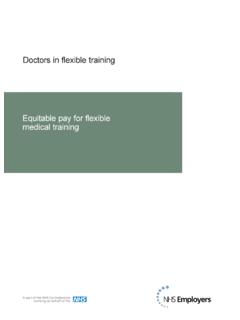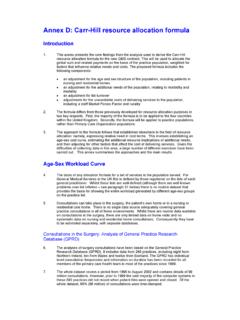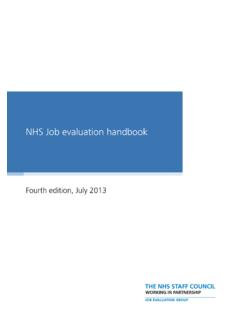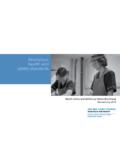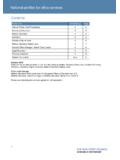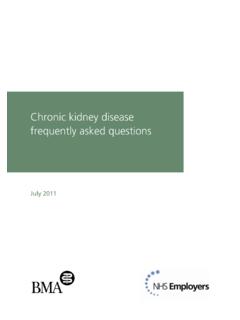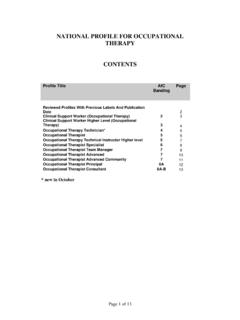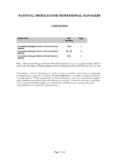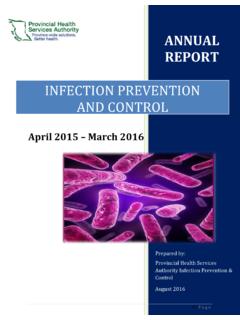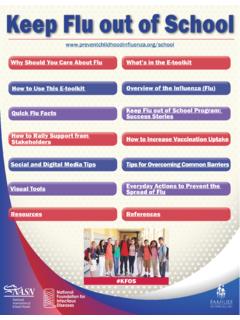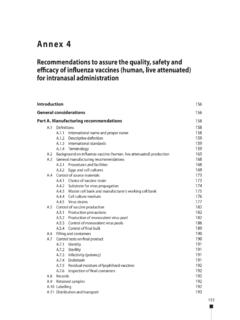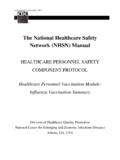Transcription of Healthcare worker vaccination: clinical evidence (updated ...
1 Healthcare worker vaccination: clinical evidence ( updated August 2016) Contents Why should we worry about influenza ? 3 Why is flu vaccination important for clinical staff? 3 Protecting yourself against flu 3 Protecting your patients against flu 3 Protecting your family against flu 4 Advice from professional bodies about the flu vaccine 4 How effective is the flu vaccine? 4 How safe is the flu vaccine? 4 Is the flu vaccine safe in pregnancy? 5 Is the flu vaccine safe for those who are immunocompromised or have HIV? 5 What about severe reactions to the flu vaccine? 5 How is safety of the flu vaccine monitored? 5 Does the vaccine contain porcine products? 6 Why do some doctors/clinicians refuse the flu vaccine? 6 When should I be vaccinated?
2 6 References 7 Every year, the influenza vaccination is offered to frontline Healthcare workers in the NHS as a way to reduce the risk of staff contracting the virus and transmitting it to their patients and service users. In 2015/16 the influenza vaccine uptake rate for frontline Healthcare workers was per cent (compared with per cent in 2014/15).1 Uptake from all trusts (aggregated by local area team) ranged from to per cent. This document outlines the clinical evidence supporting the need for flu vaccination among Healthcare workers. Why should we worry about influenza ? influenza can cause a spectrum of illness ranging from mild to severe, even among people who were previously well. The impact on the population varies from year to year, depending on how many people are susceptible, any changes to the influenza virus and the severity of the illness caused by the influenza subtype in circulation.
3 The capacity for the virus to mutate/change and the duration of protection from the vaccine (about one season), are the reasons that the vaccine is tailored each year to protect against the most commonly circulating strains and shows why annual vaccination is necessary. 2 The timing, extent and severity of influenza seasons is unpredictable and intermittent epidemics can cause significant illness and mortality. influenza activity during the 2015/16 influenza season was considered to be moderate. influenza A(H1N1)pdm09 was the predominant circulating virus for the majority of the season peaking late in week 11 of 2016 and influenza B peaking afterwards. The impact of A(H1N1)pdm09 was predominantly seen in young adults, the pattern of those affected appeared to be different across parts of the UK. Public Health England estimated that an average 8,000 people die from flu in England each year.
4 Some years that figure reaches 14,000. That's more than eight times the number of confirmed cases of measles (91), mumps (717) and rubella (5) combined in 2016 28-29 Why is flu vaccination important for clinical staff? Protecting yourself against flu Frontline Healthcare workers are more likely to be exposed to the influenza virus, particularly during winter months when some of their patients will be infected. It has been estimated that up to one in four Healthcare workers may become infected with influenza during a mild influenza season a much higher incidence than expected in the general Typically the elderly, the very young, and people with underlying medical conditions are at a greater risk of suffering severe illness. However, even previously healthy people and the young can develop severe complications from influenza including bronchitis, secondary bacterial pneumonia and, more rarely, meningitis, encephalitis and/or death.
5 In 2009/10 and 2010/11, up to one third of deaths from influenza were in people considered Many cases of severe illness were in those aged under 65 years (89 per cent of hospital admissions, 87 per cent of critical care beds occupied and 79 per cent of deaths).4-9 Protecting your patients against flu influenza is a highly transmissible infection. The patient population found in hospital is much more vulnerable to its severe Healthcare workers may transmit the illness to patients even if they are mildly or sub-clinically infected. There are reports of influenza outbreaks within hospitals and other care settings where transmission from Healthcare workers to patients is likely to have facilitated the spread of the In one outbreak, 118 staff and 49 patients were A second resulted in six infections among neonates and one Settings randomised to high levels of immunisation had reduced rates of flu-like illness, hospitalisation and mortality in the elderly in comparison with Protecting your family against flu Some Healthcare workers, aware that they are more likely to become infected with influenza , get the flu vaccination in order to try to protect their family members.
6 Particularly young children or other relatives who may fall into at-risk Advice from professional bodies about the flu vaccine Immunisation against infectious disease (The Green Book), recommends that Healthcare workers directly involved in patient care be vaccinated It is also encouraged by the General Medical Council19 as part of good medical practice, and by the British Medical Association (BMA).20 How effective is the flu vaccine? When the vaccine is well matched to the circulating strain, it is 50-70 per cent effective depending on the age and health of the person receiving ,21-23 Every February, the World Health Organization makes recommendations to vaccine manufacturers on which strains to include in the vaccine for the coming influenza season. This decision is based on a number of factors, including the strains of influenza that have recently or that are currently circulating.
7 Occasionally a strain of influenza that is different or drifted from the vaccine component will emerge after the manufacturer has started production. It takes the manufacturers six to eight months to produce sufficient quantities of vaccine for the annual influenza programme, therefore it is not possible to change the vaccine component when this happens. In some cases, this means the vaccine may be less effective against the drifted strain. However, as the vaccine has at least three components then the vaccine will usually offer some protection against the circulating influenza strains. Even a vaccine that is poorly matched can offer some level of protection. In 2015/16, the influenza season in the UK was characterised by influenza A(H1N1)pdm09 and then influenza B circulation with impact mainly in young adults and children.
8 27 Public Health England has now published the final flu vaccine effectiveness data for the 2015/16 influenza season. These results show that the flu vaccine that was used in the UK was estimated to be per cent effective overall against the circulating strains of flu last season. 27 How safe is the flu vaccine? The most common side effect can be bruising or local muscular stiffness at the injection site (10 64 per cent).24 Other reported side effects include short-lived fever, malaise and myalgia with an incidence in studies that is similar to those who receive a placebo vaccine (fever, 3 per cent vs 1 per cent; malaise, 9 per cent vs 6 per cent; myalgia, 18 per cent vs 10 per cent).25 Although people sometimes say that the vaccine gave them influenza , this is not possible. The influenza vaccines offered to Healthcare workers in the UK are inactivated and do not contain live viruses.
9 Only one vaccine (Fluenz) contains a live virus that has been attenuated and adapted to grow at temperatures below body temperature, but this is only used for the extension of the flu immunisation programme to healthy children. It is most likely that the flu-like symptoms experienced by people who have just had the vaccine are not caused by influenza but by one of many other circulating viruses that can produce influenza -like symptoms. Since it can take up to two weeks following vaccination to develop immunity to influenza , it is possible for infection to occur if exposed to influenza during this period. Is the flu vaccine safe in pregnancy? No study to date has demonstrated an increased risk of either maternal complications or adverse foetal outcomes associated with inactivated influenza vaccine. In fact there are benefits to both mother and child and inactivated influenza vaccine is now recommended for women during pregnancy.
10 Is the flu vaccine safe for those who are immunocompromised or have HIV? The Green Book: Immunisation against infectious diseases9, advises immunisation of those who are immunocompromised or have HIV. For specific references on safety, use the BHIVA guidelines at What about severe reactions to the flu vaccine? The risk of having an anaphylactic reaction to the seasonal influenza vaccine is very low, but anyone who has had a severe reaction (anaphylaxis) to a previous dose of seasonal influenza vaccine, or to any part of the vaccine, should not receive it. Individuals who have an egg allergy can be immunised in primary care with an egg-free influenza vaccine if available, or an inactivated vaccine with an ovalbumin content of less than g/ml. Patients who have either confirmed anaphylaxis to egg or egg allergy with severe uncontrolled asthma can be immunised with an egg-free influenza vaccine.
